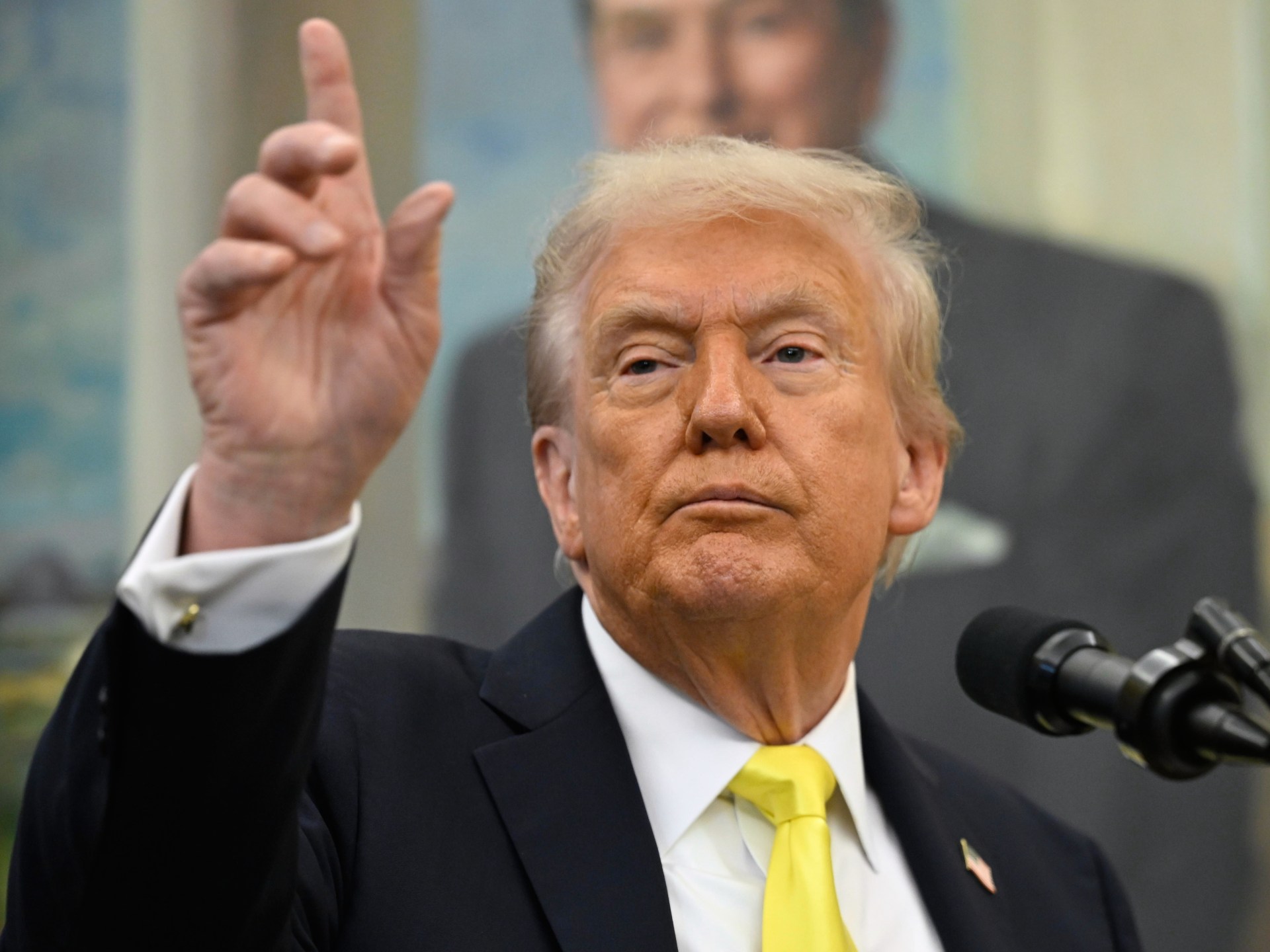Physical Address
304 North Cardinal St.
Dorchester Center, MA 02124
Physical Address
304 North Cardinal St.
Dorchester Center, MA 02124

US President Donald Trump has appeared to confirm a New York Times report that his administration has authorized the Central Intelligence Agency (CIA) to conduct covert operations in Venezuela.
On Wednesday, Trump held a news conference with some of his top law enforcement officials, where he faced questions about the report. A reporter asked directly, “Why did you authorize the CIA to enter Venezuela?”
list of 3 itemsend of list
“Really, I authorized it for two reasons,” Trump replied. “Number one, they emptied their prisons in the United States of America.”
“The other thing,” he continued, was Venezuela’s role in drug trafficking. He then appeared to hint that the United States would take action on foreign soil to prevent the flow of narcotics and other drugs.
“We have a lot of drugs coming in from Venezuela,” Trump said. “A lot of the Venezuelan drugs come in by sea. So you can see that. But we’re also going to stop them by land.”
Trump’s remarks are likely to further exacerbate tensions with Venezuela, whose leader, Nicolás Madurohas long been a target for the US president, dating back to his first term in office.
Already, both leaders have beefed up their military forces along the Caribbean Sea in a show of potential strength.
But reports in the New York Times suggest that Trump has gone a step further, giving the green light to the presence of US intelligence officials on Venezuelan soil to carry out lethal missions.
Citing unnamed administration officials, the Times says the new authorization is part of a broader strategy to oust Maduro. Reporters also tried to confront Trump on that claim.
“Does the CIA have authority to remove Maduro?” a reporter asked at the White House on Wednesday.
“Oh, I don’t want to answer a question like that. That’s a ridiculous question to be asked,” Trump said, scowling. “It’s not really a ridiculous question, but wouldn’t it be a ridiculous question for me to answer?”
He then offered an addition: “But I think Venezuela is feeling the heat.”
However, Trump’s sometimes meandering response touched on his repeated claims about Venezuela.
Since taking office for a second term, Trump has sought to assume war powers, using laws such as the Foreign Enemy Act of 1798, claiming that Venezuela had planned an “invasion” of migrants and criminal groups on US soil.
However, he offered little evidence for his claims, and his statements were undermined by the assessments of his own intelligence community.
In May, for example, a declassified U.S. report revealed that intelligence officials had found no evidence directly linking Ripe to criminal groups like Tren de Aragua, as Trump alleged.
Still, on Wednesday, Trump revisited the baseless claim that Venezuela under Maduro had sent prisoners and people with mental health conditions to destabilize the US.
“A lot of countries have done it, but not like Venezuela. They were down and dirty,” Trump said.
If accurate, the Times report would be the latest indication that Trump has been signing secret proclamations to lay the groundwork for lethal action overseas.
In August, for example, anonymous sources told US media that Trump had also signed an order allowing the US military to crack down on drug cartels and other Latin American criminal networks.
And in October, Trump was reported to have sent a memo to the US Congress claiming the country was in a “non-international armed conflict” with the cartels, which he described as “unlawful combatants”.
Many of these groups, including Tren de Aragua, have also been added to the U.S. list of “foreign terrorist organizations,” although experts note that the label alone does not provide a legal basis for military action.
However, the United States under Trump has taken a series of escalating military actions, including conducting multiple missile strikes against small vessels off the Venezuelan coast.
At least five known air strikes have been driven in boats since September 2, killing 27 people.
O most recent attack announced in a social media post on Tuesday: A video Trump shared showed a boat floating in the water, before a missile set it on fire. Six people died in that attack.
Many legal experts and former military officers said the attacks appear to be a clear violation of international law. Drug traffickers have not traditionally met the definition of armed combatants in a war.
But Trump justified the strikes by saying they will save American lives lost to drug addiction.
He maintained that the people aboard the targeted ships were “narco-terrorists” headed for the United States, although he provided no evidence for those claims.
On Wednesday, he again brushed aside a question about the lack of evidence. He also defended the concern that the attacks amounted to extrajudicial killings.
“When they’re loaded with drugs, they’re fair game,” Trump told reporters, adding that there was “fentanyl dust all over the ship after those bombs went off.”
He added: “We know we have a lot of information on every ship that goes. Deep, solid information.”
Framing the bombing campaign in the Caribbean as a success, Trump then explained that his administration could begin to reorient its strategy.
“We stopped it almost entirely by sea. Now we will stop it by land,” he said of the alleged drug trafficking. He joked that even the fishermen had decided to stay out of the water.
“We are certainly looking at land now because we have the sea very well under control.”